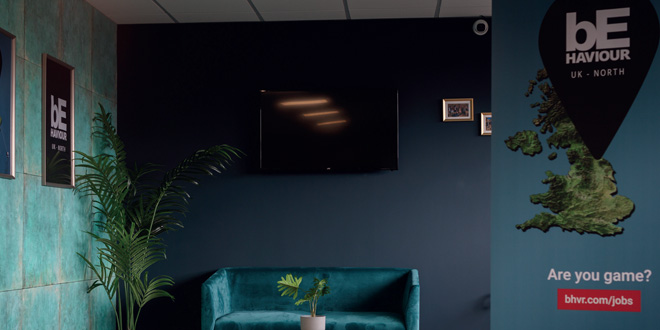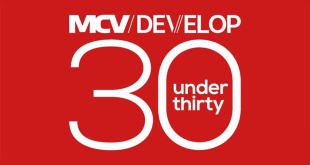Vince Pavey checks in with Wayne Meazza, executive vice president for Behaviour Interactive, to ask about group as it expands into the UK.
Behaviour Interactive has existed in some form or another since 1992, when it was founded in Quebec, Canada. It is best known these days for its asymmetrical multimillion-selling multiplayer megahit Dead by Daylight, but has worked on countless video games before, during and after; both as a solo developer working on existing and original properties, and as a co-development partner on some of the biggest video games around.
Wayne Meazza has worked at Behaviour Interactive for 13 years and counting, and the executive vice president currently has over 50 video game credits to his name – and those are just the ones we currently know about. We met up with him during Develop:Brighton to find out more about the studio’s recent growth and its acquisitions, which includes two UK studios from opposite ends of the country that have recently joined the Behaviour Interactive developer family.
You recently acquired SockMonkey Studios (now Behaviour North UK) up in Middlesbrough. What made them a good fit for the Behaviour family?
The reason why SockMonkey was a perfect fit for us is that their culture is almost identical to ours. They have a great work-life balance. They treat their employees incredibly well. They have ambition, and an enormous amount of talented new people. When you have a small company, it’s also difficult sometimes to get that break. That opportunity. So by joining us, they had the opportunity to have those breaks, kind of instantly, which is super exciting for them as well as us. We acquired them a few months ago and we’re super, super excited. We’re already starting to expand, and we’ve hired several people already in the Behaviour North office.
You acquired one UK studio, and now you’re sort of saving one [AntiMatter Games] while setting the next one in the south up. What are the advantages of working with existing teams like that?
Fundamentally, the thing that attracted us to setting up Behaviour UK South was obviously that the majority of the people are going to come from AntiMatter. They have a lot of first-person shooter experience, and Behaviour works on those types of games, as I’m sure you’re fully aware. They’re an incredible addition to the team. So we’ve got experience in first person shooters, and now we’ve got even more experience. It’s really, really great for us.
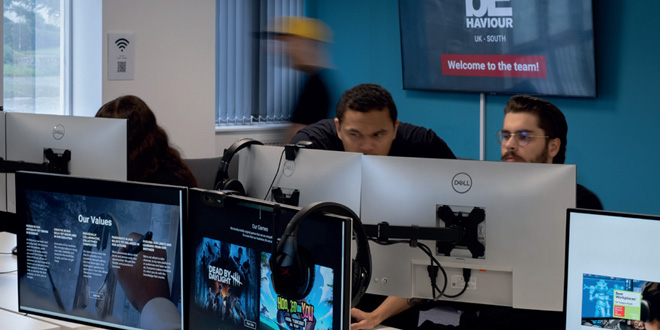
Behaviour is well-known at this point for Dead by Daylight. Is the company’s expansion plan driven by wanting more support for Dead by Daylight, or is it to diversify what you’re making?
This particular studio will not be working on what we call our Behaviour Digital Division, which is where Dead by Daylight is housed, it will be on our service business. So focusing on making games for other people. In our service business, we make games on all platforms, mobile included. That’s full-development, and sometimes co-development as well. The folks at Behaviour UK will be focused on that.
So you’ve got two studios here in the services division. Do you see further expansion here in the UK in the near future?
I think the answer to that one is ‘Why not?’ right? When the opportunity is there, or when the fit is there, we’ll take a look at it. We’re on a long-term strategic growth plan. So, the more the merrier, as they say, but it will depend on if there is a fit.
So I need to keep an ear to the ground for Behaviour UK Midlands, then?
Yeah, and then we can start adding West and East and who knows? But no, in all seriousness, the opportunity to be in the UK is very exciting to us. It’s something that we’ve been looking at for a long time. We’re in a very solid position to be able to expand at this moment. So hopefully, we can help as well and keep the industry strong here. Help out where we can, right? We’re kind of like the new neighbours in town, or the new kids on the block, or whatever you want to call it. With that in mind, if we can help out and help grow the industry – where there’s some challenges at the moment, as you know – we’d be more than happy to. It’s not about charity. It’s about fit. If it makes sense, we’ll do it. Like with all of the really cool people that are former AntiMatter employees. We just found the fit. That makes sense. If we didn’t, we wouldn’t do it.
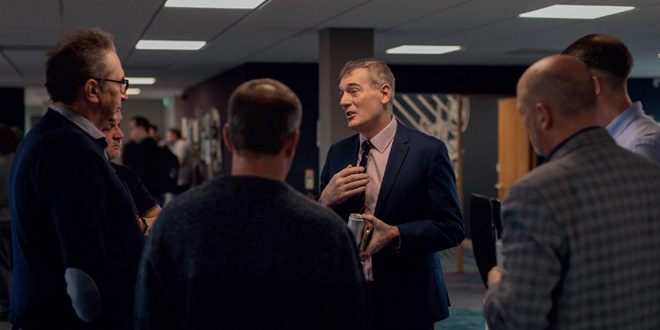
Behaviour Interactive won an award for being one of Canada’s best workplaces by GI.biz last year. So did SockMonkey, for the UK. How do you ensure that sort of culture is kept in place at studios as you’re expanding?
That’s one of the questions we always want to make sure we ask ourselves, and I think really it fundamentally starts with a company like SockMonkey or the AntiMatter folks. We have to have that already, that similar cultural fit. That makes it a lot easier. We don’t want to force people to work with our culture, we want them to already embrace it, because it is something they’re already doing, or they aspire to do. Sometimes it’s not always possible due to financial constraints, or pressure to get that next milestone down, or whatever.
As long as the individuals have the ambition, and the company has that kind of ambition, cultural integration is much, much simpler. Of course, there are always these local nuances between every team. Even between the north and the south of the UK, there’s obviously going to be differences. We’ll try to accommodate those where it makes sense. I think what Behaviour is offering should be welcoming for everyone, and should be embraced by everyone, because I honestly believe that what we’ve built over the last 31 years is very appealing and attractive to employees.
Do the studios you take on stay quite autonomous, then?
They’re actually very integrated into the service business. They work with their colleagues in Montreal, in Toronto, and now with north and south, who will work with each other as well. Our philosophy is not to have individual studios with very specific expertise. It’s more about what people want to work on. It doesn’t matter about your location. So if you want to work on some exciting project, we will try and accommodate that where possible. Of course, part of that is assuming they have the skill sets to achieve that. That’s how we kind of start working on projects. First, find the passionate people. Then, we check their skill sets to make sure that makes that a double fit.
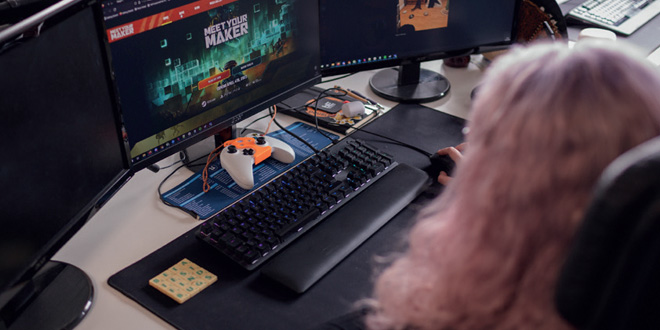
So is that remote working based?
Behaviour as a whole has a company policy of work-life balance, and that includes flex. We call it flex as it allows you to work from home, or work in the office, or a combination of both. We put that in place very early on in the pandemic, and we now have no plans to change it. Whether you want to work fully remote, work parttime in the office, or full-time in the office, you have the choice. It’s yours. Obviously, we would love for people to come to the office, because it’s a good environment for creativity. It’s also a good environment for socialisation. We do encourage people to come to the office, but it’s not mandatory.
Okay, so there are three business units and you’ve said you’re in a good position to expand. Obviously you’re in charge of just one of them, but are all three units expanding at the moment?
Yeah, absolutely. You know, at different paces, as it depends on what it is. Behaviour as a company has enormous ambitions to expand and grow. It’s not just about growing in people, but it’s about growing our products as well. It’s not just about growing our locations. At the end of the day, the most important thing to us is that our players are happy outside of employees being happy, with really cool projects to work on. Our players are number one. The fans are our focus. As we keep growing and expanding, our business units will then benefit from that, too.
… and there’s not any internal concern that you could take on too much?
No, I think it’s important to understand that we only take on what we can achieve, because if we don’t, then we can’t sustain a work-life balance. We are very good at planning projects out. It doesn’t matter which business unit. All of them are exceptional at this. We’ve got a lot of experience in managing projects. The most important thing is quality. We always try to achieve the highest quality possible and give the best experience to our players.
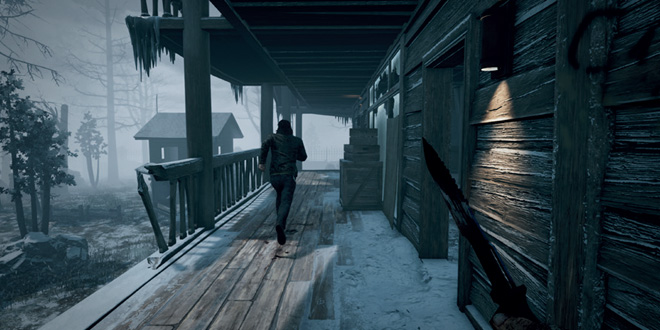
How many projects would you say you’re working on at the minute?
Many. We’re over 1200 people. That’s a lot of manpower to make a lot of projects. We would love to do more. We believe that the market is ready to have more. So we have expansions in the Cornish countryside, and with the Middlesbrough office that we’ve already set up. We have the opportunity to take on more projects, and do more things, and be more ambitious, and really, that’s our focus for the next several years.
So obviously, everything is consolidating. Do you see the moves Behaviour is doing as similar to that, or is it from a different angle?
I don’t see it as a consolidation. I see it as an expansion. Yes, sometimes that means an acquisition, so technically a consolidation, but sometimes it means just growing. You know, growing our Montreal office, growing our Toronto office, and now Middlesbrough and Cornish offices, and who knows, others in the future, I’m sure. I don’t see it that other way, I just see us growing as a group.

 MCV/DEVELOP News, events, research and jobs from the games industry
MCV/DEVELOP News, events, research and jobs from the games industry
